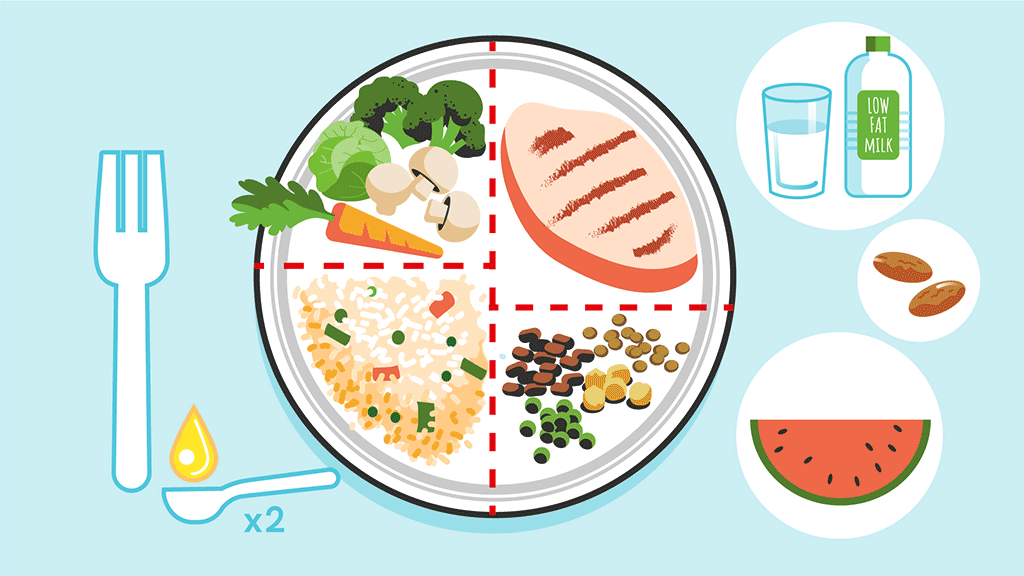Healthy Eating during Ramadan
Remember to eat sensibly and healthily all year round but also during Ramadan.
Divide your daily calories between Iftar and Suhoor with 1-2 snacks in between if needed.
What types of food should I eat at Iftar?
Begin with plenty of water to overcome dehydration from fasting and 1-2 small fresh or dried dates for a quick source of energy after your fast.
Eating too much fried food and food high in fat (samosa, pakora, ghee) and sugar at Iftar, will make you put on weight and raise your blood sugar levels for longer periods of time and make them more difficult to control.
Ensure your meals are well balanced and moderate in portion sizes. Use the ‘Ramadan Plate’ method to help design your meals.
- Include plenty of vegetables, salad and non creamy vegetable soups, as they contribute to a feeling of fullness and aid in regulating bowel movements. Try to start with your veggies first.
- Carbohydrates should make up 45-50% of your total daily caloric intake. Choose high fiber carbohydrates with a low glycemic index such as beans, whole-grain rice, whole wheat bread, wholewheat pasta , bulgur or harees.
- Proteins should account for 20-30% of your total daily caloric intake. They help maintain your lean body mass and enhance satiety.
Include lean proteins such as fish, skinless poultry, nuts, seeds and legumes.
- Fats should comprise less than 35% of your total daily caloric intake. Choose polyunsaturated and monounsaturated fats such as olive oil, fatty fish such as salmon, tuna and sardines for a source of omega 3 fatty acids. Be careful about the dressings and the oil amount you use while cooking. Try to measure the oil with a spoon. In this way, you will be able to limit the consumption.

What types of food should I eat at Suhoor?
Long hours without eating increases the risk of hypoglycaemia. It will be easier to balance your blood glucose levels through the fast if you eat a meal at Suhoor, just before sunrise, rather than at midnight.
Importance of Suhoor
- Your body’s main source of energy to go through a Ramadan day.
- Helps prevent headaches and nausea during the fasting hours by regulating blood sugar levels.
- Reduces thirst during the day.
Make sure you include all the essential food groups at Suhoor to make up a balanced plate.
- Breads, cereals & grains
- Milk & Dairy,
- Lean meat and legumes,
- Fruits
- Vegetables
Choose complex carbohydrates which release energy slowly and provide the body with energy for longer hours during the day, such as multigrain bread, oat-based cereals or legumes.
Include lean sources of protein such as low fat cheese, labneh, eggs or legumes.
What types of drinks can I have?
Long hours of fasting can put you at risk of dehydration and also if you have high blood glucose levels.
- Drink plenty of sugar-free fluids, particularly water between Iftar and Suhoor.
- Avoid sugary drinks, canned and fresh juices with added sugars.
- Limit caffeinated drinks such as tea, coffee and cola drinks, choose low fat milk or laban instead.
Leave a Reply